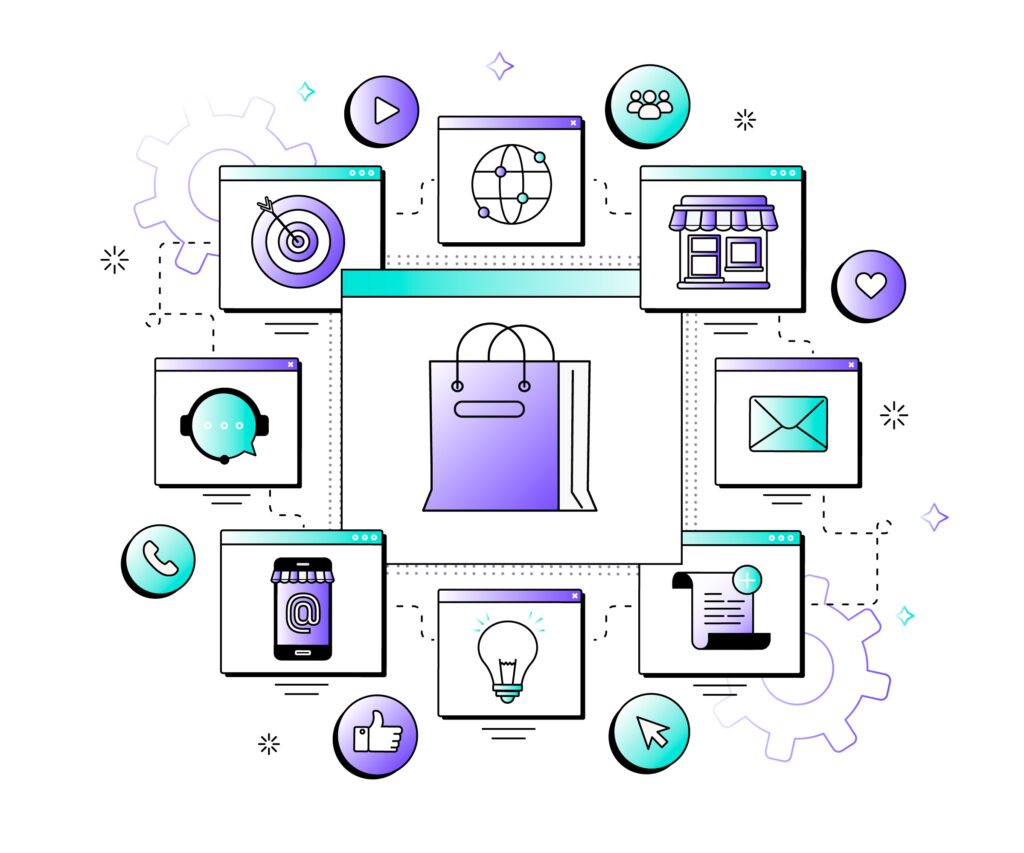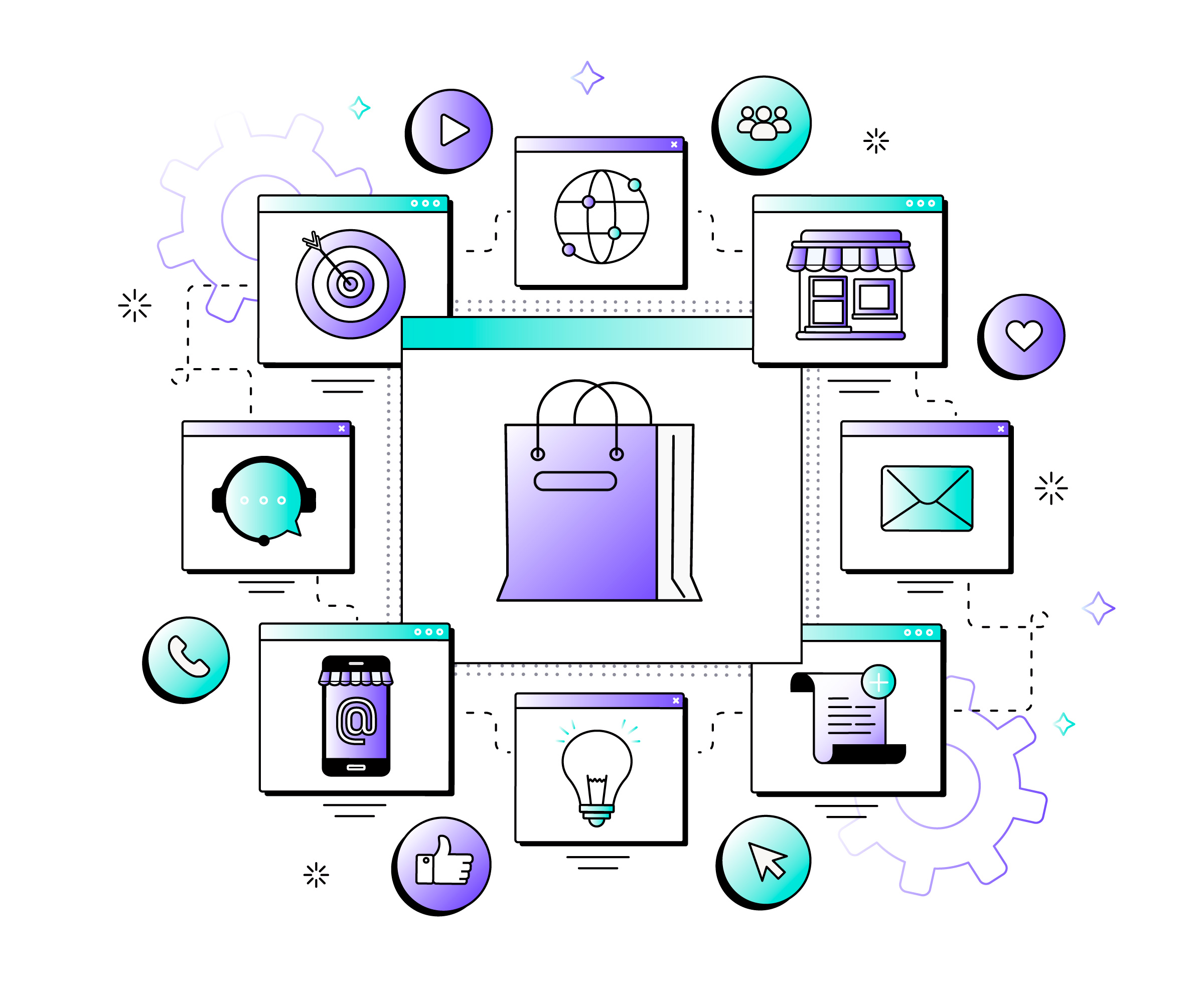ERP and E-commerce: Optimizing Online Sales and Fulfillment
In today’s fast-paced digital world, e-commerce has emerged as one of the most effective ways to reach customers and grow your business. But as your online sales volume grows, so does the complexity of managing your e-commerce operations. This is where an Enterprise Resource Planning (ERP) system can come in handy, enabling you to optimize your online sales and fulfillment processes.

ERP and e-commerce work together to provide a seamless flow of data between your e-commerce platform and your back-end systems. In this article, we will explore how an ERP system can help optimize your e-commerce operations, improve customer satisfaction, and increase sales.
What is an ERP system?
An ERP system is an integrated suite of software applications that can automate and manage a wide range of business processes, including financial management, inventory control, procurement, supply chain management, and customer relationship management (CRM). An ERP system can be used by businesses of any size and in any industry.
How does an ERP system work with e-commerce?
When integrated with an e-commerce platform, an ERP system can help manage and automate many of the key processes involved in online sales and fulfillment. For example, an ERP system can automatically update inventory levels and pricing in real-time, as sales occur. This ensures that your customers always have accurate information about product availability and pricing, which can help reduce cart abandonment rates.
An ERP system can also help streamline order fulfillment by automatically generating packing slips, shipping labels, and tracking information. This can reduce the amount of time and effort required to manage order fulfillment, freeing up resources to focus on other aspects of your business.
In addition, an ERP system can provide valuable insights into customer behavior, such as purchase history, preferences, and order patterns. This information can be used to personalize marketing campaigns, improve customer service, and develop new products and services that meet the needs of your target audience.
What are the benefits of using an ERP system for e-commerce?
There are many benefits to using an ERP system to optimize your e-commerce operations. Here are just a few:
ERP and E-commerce: Improved efficiency and productivity
By automating many of the key processes involved in e-commerce, an ERP system can help improve efficiency and productivity. This can free up resources to focus on other aspects of your business, such as marketing, product development, and customer service.
Real-time inventory management
An ERP system can provide real-time inventory management, ensuring that your customers always have accurate information about product availability. This can help reduce cart abandonment rates and improve customer satisfaction.
Streamlined order fulfillment
An ERP system can streamline order fulfillment by automatically generating packing slips, shipping labels, and tracking information. This can reduce the amount of time and effort required to manage order fulfillment, improving efficiency and customer satisfaction.
ERP and E-commerce: Personalized customer experiences
An ERP system can provide valuable insights into customer behavior, enabling you to personalize marketing campaigns, improve customer service, and develop new products and services that meet the needs of your target audience.
Reduced costs
By automating many of the key processes involved in e-commerce, an ERP system can help reduce costs associated with manual labor, inventory management, and order fulfillment.
ERP and E-commerce: What are some popular ERP systems for e-commerce?
There are many ERP systems available on the market today, each with its own set of features and benefits. Here are a few popular ERP systems for e-commerce:
NetSuite
NetSuite is a cloud-based ERP system that can be used by businesses of all sizes. It offers a wide range of features, including financial management, inventory control, order management, and CRM.
SAP Business One
SAP Business One is an ERP system designed specifically for small and mid-sized businesses. It offers features such as financial management, inventory control, and customer relationship management.
Microsoft Dynamics 365
Microsoft Dynamics 365 is a cloud-based ERP system that offers a wide range of features, including financial management, inventory control, order management, and customer relationship management. It is designed for businesses of all sizes and can be customized to meet the specific needs of your business.
Oracle ERP Cloud
Oracle ERP Cloud is a cloud-based ERP system that offers a wide range of features, including financial management, supply chain management, procurement, and project management. It is designed for businesses of all sizes and can be customized to meet the specific needs of your business.
Epicor ERP
Epicor ERP is an ERP system that can be used by businesses of all sizes. It offers features such as financial management, inventory control, order management, and customer relationship management
An ERP system can be a valuable tool for optimizing your e-commerce operations, improving efficiency, and increasing customer satisfaction. By automating many of the key processes involved in e-commerce, an ERP system can help reduce costs, improve inventory management, and streamline order fulfillment. It can also provide valuable insights into customer behavior, enabling you to personalize marketing campaigns and improve customer service.
When choosing an ERP system for your e-commerce business, it’s important to consider your specific needs and requirements. Look for a system that offers the features and functionality you need to manage your e-commerce operations efficiently and effectively. With the right ERP system in place, you can take your e-commerce business to the next level and achieve greater success in the digital marketplace.
Simply CRM is a cloud-based customer relationship management (CRM) software that can be used as an enterprise resource planning (ERP) solution. Simply CRM is designed to help businesses manage their entire business processes, including sales, marketing, customer service, inventory management, and more.
Here are some of the ways Simply CRM can be used as an ERP:
Sales Management:
Simply CRM provides a comprehensive sales management module that helps
businesses manage their entire sales process, from lead generation to
closing deals. The sales module includes features such as lead tracking,
sales forecasting, sales pipeline management, and sales analytics,
which can help businesses streamline their sales processes.
Marketing Automation:
Simply CRM offers powerful marketing automation features that enable
businesses to create and execute targeted marketing campaigns across
multiple channels. The marketing module includes features such as email
marketing, social media marketing, and campaign tracking, which can help
businesses automate their marketing processes and drive more leads and
sales.
Customer Service:
Simply CRM includes a customer service module that enables businesses to
manage customer inquiries, complaints, and support requests. The
customer service module includes features such as ticket management,
knowledge base management, and customer feedback, which can help
businesses provide excellent customer support and improve customer
satisfaction.
Inventory Management:
Simply CRM also includes an inventory management module that enables
businesses to manage their inventory levels and track their stock
movements. The inventory management module includes features such as
stock alerts, reorder management, and purchase order management, which
can help businesses optimize their inventory levels and reduce the risk
of stockouts.
Reporting and Analytics:
Simply CRM includes powerful reporting and analytics capabilities that
enable businesses to track their performance across all their business
processes. The reporting and analytics module includes features such as
custom dashboards, data visualization, and real-time reporting, which
can help businesses make data-driven decisions and improve their overall
performance.
Overall, Simply CRM is a powerful ERP solution that can help businesses manage their entire business processes, from sales and marketing to customer service and inventory management. Its cloud-based platform, intuitive user interface, and robust feature set make it an ideal choice for businesses of all sizes looking to streamline their operations and improve their bottom line.
Additional reading about ERP:
- What Is ERP (Enterprise Resource Planning)?
- How ERP Software Impacts Quality
- What Is ERP Software—How Does It Work & Why Use One?




